Workers, Arab communities and young people: The voters who will break the virtual tie between Trump and Harris in Michigan
In the heart of the automotive industry, votes have typically been cast for economic reasons — but this year, the war in Gaza and Lebanon has been added to the equation
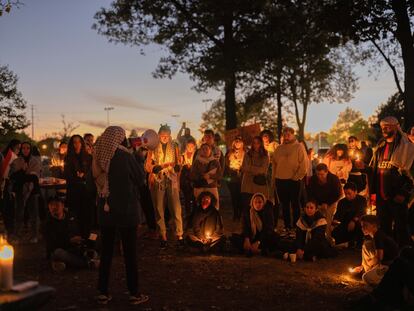

For many, Michigan has taken the shape of a great big question mark: what will be the outcome of the November elections in the swing state? Traditionally a Democratic stronghold, Republican candidate Donald Trump won the state in 2016, which paved his way for victory in the election.
As conversations unfold in 2024 — from the state’s vibrant and modern Yemeni cafés, which serve as gathering places for its key Arab community, to the factory assembly lines at Ford, a cornerstone of an area heavily reliant on the auto industry — voter doubts abound, making it challenging to synthesize clear election predictions. Polls indicate a near tie between Trump and Democratic candidate Kamala Harris.
From Allen — a former Republican voter who has switched to the Democrats “because of Trump and his lies” — to Leila —a young woman of Arabic heritage who plans to vote for a third-party candidate because she cannot “trust those [the Democrats] who are financing the Israeli genocide in Palestine” — voter opinions vary widely.
Additionally, there are the undecided voters — political orphans who feel unrepresented by any of the major candidates — who are most numerous among younger age groups and progressives. “I still don’t know who to vote for; they both seem the same. But my three kids have made up their minds: they’re not voting for anyone,” says Maggie, an African American waitress at a Dearborn diner that appears to have been frozen in time since the 1950s. She adds that she will ultimately vote “with her wallet.”
Trump’s surprise victory in Michigan in 2016 was fueled by support from a segment of the electorate made up of working-class white voters — victims of globalization and what economists Angus Deaton and Anne Case have termed “deaths of despair,” which include losses to alcoholism, suicide, and overdose: a reflection of the agony of the American dream.
In 2020, President Joe Biden reclaimed the state by appealing to these same voters, promising to revive local industry. Trump won eight years ago by a mere 10,000 votes (0.2%), while Biden triumphed over his opponent by a narrow margin of just 150,000 votes.
That key socioeconomic demographic, which played a significant role in the last two elections and is prevalent in Wisconsin and Pennsylvania — two other Rust Belt swing states — remains crucial this year, particularly as concerns about inflation and rent affordability mount. However, the influence of these issues at the ballot box may be overshadowed by geopolitical factors, particularly the emotional toll being felt by the Arab American community due to the ongoing wars in Gaza and Lebanon.
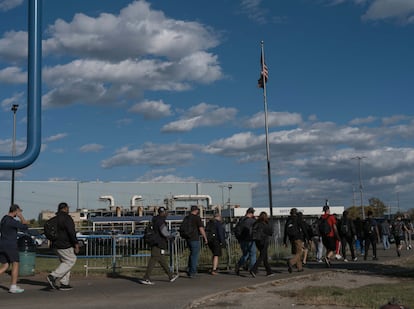
In a state where the working-class vote is typically the primary concern, even union leaders like Nick Kottalis, president of United Auto Workers Local 600 at the Dearborn Truck Plant, acknowledge that the Arab American vote will be crucial in November. “Of the 4,000 workers at the factory, there’s essentially a tie between Trump and Harris among white people and African Americans. The unknown factor will be those of Arabic heritage, who are also very divided. From what some have told me, the majority will likely choose a third option, whether that means supporting a third-party candidate or abstaining altogether,” says Kottalis, a self-described Democrat, as he sips tea in the factory cafeteria among workers.
The third-party candidates Kottalis mentions are the same ones that university student Leila is considering, including Jill Stein from the Green Party. Despite having run for the U.S. presidency twice before, Stein has gained more traction in Michigan this year than ever before.
Experts warn that the Arab community’s discontent will not be the only factor influencing the election in November. Capturing the votes of undecided and the most pragmatic of the disillusioned voters will be crucial. “If the Democrats struggle to connect with Arab Americans or young people, or if Republicans have trouble appealing to unions or rural voters, they won’t fare well. The candidate who better attracts these key demographics will win,” explains David Dulio, a political science professor at Oakland University.
He emphasizes that the stakes in Michigan cannot be boiled down to a single issue, given the tight race. “This year, a variety of factors make Michigan especially competitive: concerns about the economy — particularly inflation — immigration, general dissatisfaction with the country’s direction, and potential shifts among specific voter segments [Arab Americans, young people, and union workers].”
When it comes to the “blue wall” that Kamala Harris is relying on to secure a victory in the White House, Pennsylvania is often seen as the most crucial state. However, Michigan presents a more complex challenge, marked by a decline in Democratic support among union workers, Arab Americans, and young voters. Alongside Ohio and Wisconsin, Michigan is one of three states identified by the Cook Political Report — a non-partisan election analysis outlet — as a toss-up for Senate races for Democrats. Just a month ago, U.S. Congresswoman Elissa Slotkin, who is running for Senate in November, alerted her donors that her internal polls indicated Harris was failing to gain a foothold in the state.
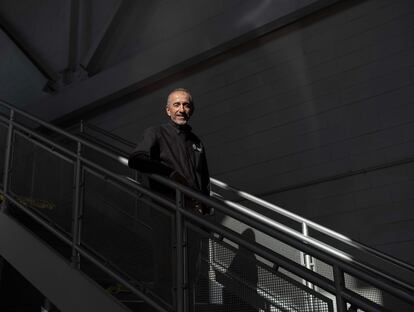
Kottalis agrees that the Democratic candidate’s chances have been hurt by “Trump’s dirty war against unions, his attempts to get support from some leaders [the head of the Teamsters even spoke at the Republican convention, though he did not go so far as to make an endorsement] and, above all, lies about inflation, competition with China and Biden’s electric vehicle manufacturing incentives.”
“It’s not true that the Democrats are going to get rid of conventional vehicle manufacturing, in fact we’re proud to have them on our side — Biden was the first president that joined a striking workers’ picket line,” recalls Kottalis, hearkening back to the massive UAW strike against the three automotive industry leaders in which the president pumped up workers, mic in hand. The powerful union has endorsed the Democrats, although the Republicans have made concerted efforts to undermine its members’ support for their opponents.
Kottalis, who is a bundle of nerves and locked to his cell phone, says goodbye at the doors of the factory. In the parking lot, another worker, Allen, answers questions hurriedly while maneuvering a super-sized pickup truck made by his employer. He confirms, as does Kottalis, that many blue-collar workers support Trump — but that he himself has gone in the other direction.
“I was a Republican voter, I voted for Reagan and Bush, even Trump in 2016, but I regretted it right away when I saw the damage he was doing to the country. Plus, he’s got no plan, only lies, like the one about electric cars. Trump has hijacked the Republican Party, it isn’t our party anymore,” he says emphatically. “So yes, I am a proud Harris voter, as I was in 2020 for Biden, because they are decent people.”
Allen is optimistic about the election, but does say that talking about politics with his coworkers is risky, “because many of them have bought Trump’s lies, like him blaming Biden for inflation, which is one of the issues they’re most concerned about, and they are going to vote Republican because of that.”
According to a recent Gallup poll, the economy is the most important issue in the presidential elections. It’s also the reason why one out of every four African Americans under the age of 50 in Michigan — traditionally a group that votes Democrat — is supporting Trump, as reflected in a recent NAACP poll.
“Arab voter alienation”
“In such a close election and in a polarized country with such acrimonious politics, the key in Michigan and other swing states will be to mobilize voters who already support Democrats and Republican, rather than to persuade undecided voters to switch,” says Justin Gest, a professor at George Mason University. “That is why the alienation of Arab voters is so critical in Michigan; they have been disproportionately Democrat. To compensate, Democrats will have to focus their efforts on attracting African Americans from the Detroit area or limit their losses among working-class white voters in Michigan’s more rural districts.”
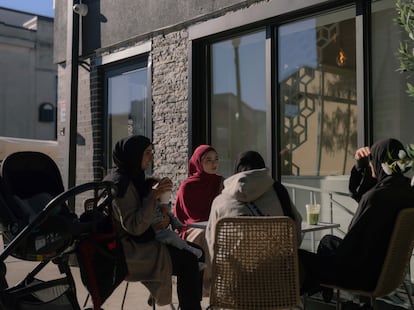
Polling in traditional Democrat strongholds reflects alienation among Arab voters. A late August survey by the Council on American-Islamic Relations revealed a 40% drop in Muslim support for Democrats. Many are leaning towards third-party candidates like Stein (who had the support of 29% of respondents). Their disaffection is due not only to White House support for Israel, but also to perceived gestures of contempt, such as when the Harris campaign refused to allow a Palestinian woman to talk about the suffering in Gaza at the Democratic National Convention in Chicago.
Political consultant and veteran activist Hassan Jaber, who is a supporter of the Uncommitted movement, says the Chicago convention as the electoral turning point for his community. “All the bridges were burned there, all the lines of communication,” he said in reference to the convention, which took place 10 days before the poll.
Before that point, the Uncommitted movement had a notable public presence, advocating for withholding votes from Biden in primary elections across the country. “The message now, after the slamming of the convention door, is that of freedom to vote in November. Some will vote for Harris, others will vote for Jill Stein, and many others will not vote at all, even though they are aware that it benefits Trump,” explains Jaber. “As some friends were telling me the other day, there are many people who would rather see it all go to pieces, explode, than vote for those who they feel are betraying them.”
“I wouldn’t vote for Kamala Harris even if they forced me to at gunpoint,” says Leila, the Lebanese college student from Dearborn. “They say she has more compassion for Palestine victims than Biden, but the administration she represents, whose policies will continue if she wins, hasn’t done anything but send arms to Israel to massacre our families. They never stop talking about how Israel has the right to defend itself. Does she know what it’s like to go to two funerals in one day for family members who were murdered by the bombs sent by her White House?”
Miriem, who stands next to Leila and wears a hijab covering her head, speaks up. “It’s that no candidate is going to get to the White House if they don’t succumb to the pressures of Jewish lobbyists, that’s the only reality.”
“And the blood spilled daily in Gaza and Lebanon, that’s another,” replies Leila, her voice mingling with those of a group of friends who are also gathered at the Shatila bakery, which rightly boasts that it sells the best baklava in the country. Despite its exquisite wares, its names conjures the sadness of a tragic memory, that of the Palestinian refugee camp in Beirut whose inhabitants were massacred in 1983 by Israel-supported Christian militias.
Traveling from the Ford plant to the supposed downtown of Dearborn — rather than a city, it most aptly resembled a series of endless suburbs lacking any urban center, dominated by highways and vehicles and car dealerships — you can count the campaign signs on one hand. Just a couple are in favor of Biden or Harris, in contrast to dozens of Lebanese and Palestinian flags. Once again, the uneasiness and anger of tens of thousands of Arab voters are on full display.
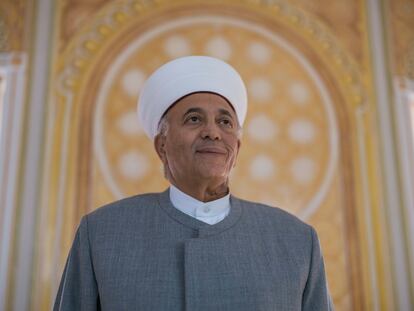
Radwan Mardini, a Lebanese imam at the American Muslim Center — situated in a quiet residential suburb adorned with Lebanese flags and signs denouncing genocide in Gaza — often receives requests for election advice from his congregation. “Every day, every other day, when we’re not officiating funerals for relatives killed,” he explains.
He recounts a recent tragedy: “An American-Lebanese neighbor was killed in an Israeli bombing in southern Lebanon, and the [Biden] administration refused to acknowledge him as an American citizen to avoid criticism of the war it is helping to finance. Who do you think I recommend the faithful vote for? Neither of the two candidates; they are the same!” he exclaims.
In 2023, Dearborn, located on the outskirts of Detroit, became the first Arab-majority city in the United States, with 55% of its 110,000 residents originating from the Middle East or North Africa. While they may not represent a vast electorate and are certainly divided in their voting preferences, even a handful of ballots — like the 10,000 that gave Trump his victory over Hillary Clinton in 2016 — could be pivotal in determining the path to the White House.
Rural Trumpists accept false claims of voter fraud
Many Michiganders have adopted the doubts surrounding the 2020 election results that Trump baselessly promoted, which motivated the Capitol attack by a horde of his supporters. According to an NPR-PBS poll, more than half of Americans express concern — whether worried or very worried — about potential fraud in this year's elections. This sentiment is particularly pronounced in homogeneously white rural areas of the state. The reaction of these denialists to a hypothetical narrow Harris victory has put election officials and state authorities on high alert.
In a virtual forum organized by the Harvard-Kennedy School Center for Democratic Governance on October 1, Michigan Secretary of State Jocelyn Benson stated, “We always hope for the best and plan for every contingency.” She said that her office is collaborating with local authorities to prepare for possible disruptions or disturbances. “The best defense against the potential for violence is to be well-prepared and committed to ensuring not just a peaceful transfer of power, but also a peaceful elections process.” This challenge confronts not only Michigan, but every other state poised to play a decisive role in the November elections.
Sign up for our weekly newsletter to get more English-language news coverage from EL PAÍS USA Edition
Tu suscripción se está usando en otro dispositivo
¿Quieres añadir otro usuario a tu suscripción?
Si continúas leyendo en este dispositivo, no se podrá leer en el otro.
FlechaTu suscripción se está usando en otro dispositivo y solo puedes acceder a EL PAÍS desde un dispositivo a la vez.
Si quieres compartir tu cuenta, cambia tu suscripción a la modalidad Premium, así podrás añadir otro usuario. Cada uno accederá con su propia cuenta de email, lo que os permitirá personalizar vuestra experiencia en EL PAÍS.
¿Tienes una suscripción de empresa? Accede aquí para contratar más cuentas.
En el caso de no saber quién está usando tu cuenta, te recomendamos cambiar tu contraseña aquí.
Si decides continuar compartiendo tu cuenta, este mensaje se mostrará en tu dispositivo y en el de la otra persona que está usando tu cuenta de forma indefinida, afectando a tu experiencia de lectura. Puedes consultar aquí los términos y condiciones de la suscripción digital.








































